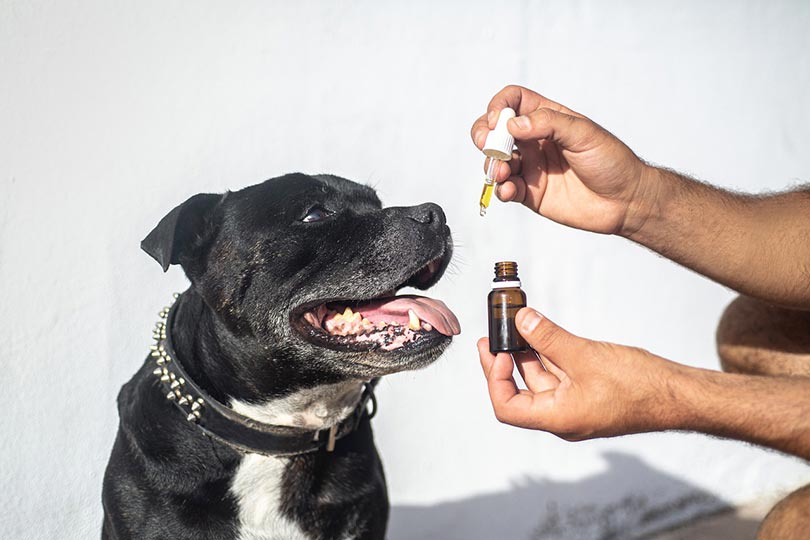In this article
Separation anxiety is the most common type of anxiety disorder in dogs, and it can be very severe. Dogs are known to experience separation anxiety when their guardians leave them alone. This can manifest in a variety of destructive behaviors, such as chewing furniture or barking incessantly. While the condition is often frustrating for dog owners, it can be treated relatively easily with a combination of training and medication.
In recent years, CBD oil has become a popular remedy for a variety of human health issues. Some dog owners have begun using CBD oil to help treat their pets’ separation anxiety. But does it work? There is some anecdotal evidence that CBD may help dogs with separation anxiety. However, there is not yet any scientific research to back up these claims. Dogs with separation anxiety may benefit from CBD oil if it is used regularly, but more research is needed to determine whether or not this is the case.

What Is CBD?
Cannabidiol, also known as CBD, is one of the compounds found in cannabis and hemp plants. In most CBD oils, the psychoactive compound delta-9-tetrahydrocannabinol (THC), which gives marijuana its effects, is not present. A variety of studies conducted on humans have demonstrated that cannabinoids interact with endocannabinoids, both in the peripheral and central nervous systems.1 CBD and THC are cannabinoids, which mimic the endocannabinoids that all vertebrates produce naturally.
There are receptors throughout the body for endocannabinoids. As master regulators, endocannabinoids send signals to other body systems to slow down or speed up, thereby stabilizing and re-establishing the body’s equilibrium. There are several different ways in which cannabis cannabinoids act on these receptors. The high caused by THC is different from the anti-inflammatory effects that are caused by CBD. CBD is becoming more enticing for pet owners to try it on their dogs since more and more people are using CBD for their own ailments.

How Does CBD Affect Dogs?
Researchers in the United States and overseas have examined the use of CBD to treat an array of conditions in dogs, including osteoarthritis pain, seizures caused by intractable idiopathic epilepsy, and noise-induced fear. CBD has been found to be effective for the treatment of arthritis, with limited success in treating seizures and behavioral issues. It was also found to be well tolerated with minimal to no side effects in many studies.
Is CBD Harmful to Dogs?
As far as CBD is concerned for dogs, it has been shown to cause diarrhea, lethargy, dry mouth, and a change in liver enzyme levels after several weeks (especially in dosage studies). This makes it relatively safe compared to THC (Tetrahydrocannabinol), which can cause toxicity at prescribed human dosages. One of the main concerns with CBD is that it inhibits a chemical pathway called cytochrome P450 in the body, which is responsible for metabolizing most drugs. There’s a chance CBD might make a drug less effective if its metabolized product determines its efficacy.
CBD could make a drug toxic if it’s not cleared from the body within a certain time frame. If your dog is taking other medications, you should never give them CBD without first consulting a veterinarian.
If you need to speak with a vet but can't get to one, head over to PangoVet. It's our online service where you can talk to a vet online and get the personalized advice you need for your pet — all at an affordable price!
Can CBD Products Help Dogs With Anxiety?
The FDA has not yet approved the use of CBD or any other hemp-containing products in animals to treat any ailment. If you plan to administer CBD to your pet, you should consult with your veterinarian before doing so.
Dog owners who seek relief for their dog’s anxiety, especially noise reactivity, often turn to CBD. In spite of anecdotal accounts of its efficacy, no controlled study has yet demonstrated its benefits. A University of Western Australia study may offer hope for aggressive behavior. After 15 days of CBD administration, shelter dogs with aggressive tendencies exhibited less aggression toward humans. University of Kentucky researchers found that physiological responses to noise were not significantly different between CBD and placebo, but worse than trazodone (a commonly prescribed anxiety drug). It should be noted, however, that CBD was administered 4–6 hours before testing, which may have been too long.
Is There Anecdotal Evidence That CBD Products Help With Separation Anxiety?
There is plenty of anecdotal evidence to suggest that CBD products can help with separation anxiety in dogs. Anecdotal evidence is evidence that is based on personal experience rather than scientific study. Many people, including some vets, believe that CBD products can help calm dogs who are anxious when their owners leave them alone. Although there have not been any scientific studies to confirm this, the overwhelming anecdotal evidence suggests that it may be worth trying if your dog suffers from separation anxiety. But remember, you need to speak to a veterinarian first!

What Kind of CBD Should I Buy?
A veterinarian should be consulted before starting a CBD regimen for pets, and high-quality CBD products should be used. In the marketplace, there are a lot of products, but not every product is made properly, labeled correctly, or contains what it says on the label. Make sure that you are only using brands that are able to provide lab-tested results with their products so that you can be sure that the dosing information is accurate and the product is free of contaminants.
Recognizing the Signs of Separation Anxiety in Your Dog
Separation anxiety is a common problem in dogs, characterized by behavior such as whining, barking, pacing, and destructiveness when the dog is left alone. Dogs with separation anxiety may also drool, urinate, or defecate in inappropriate places. They may dig holes in your lawn, destroy your furniture, or break out and roam the neighborhood.
Left untreated, separation anxiety can lead to significant behavioral problems in dogs. If your dog is exhibiting any of these signs, it is important to consult with a veterinarian or qualified behavior professional to help address the issue. There are a variety of treatment options available, and most dogs will respond well to a combination of approaches. If your dog has separation anxiety, they are one amongst hundreds of thousands of dogs in the U.S. to suffer from this stress. It is one of the most commonly diagnosed behavioral problems in dogs, according to the American Veterinary Medical Association. 20% of dogs in North America suffer from separation anxiety, and 15% do not respond to medication.


Conclusion
In conclusion, CBD does show promise as a potential treatment for separation anxiety in dogs. However, more research is needed to confirm these findings as there are still some unknowns about CBD and its effects on dogs. More research is needed to determine the correct dosage and in particular to investigate CBD’s interactions with other medications. Dosage and source should also be considered before starting CBD for dogs.
If you are considering using CBD to help your dog with separation anxiety, please consult your veterinarian first.
Featured Image Credit: Aleksey Boyko, Shutterstock






















